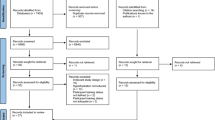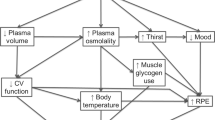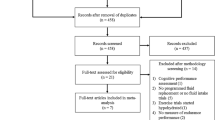Abstract
During athletic competition or recreational pursuits, a body’s hydration level can become compromised, resulting in a decrement in performance. Glycerol (1,2,3-propanetriol) has been used to induce hyperhydration in an attempt to offset the deleterious effects of dehydration. When glycerol is consumed orally, it is rapidly absorbed primarily in the small intestine. It is reported to be evenly distributed among all fluid compartments, with the exception of the cerebral spinal fluid and aqueous humour, and promotes hyperhydration by inducing an osmotic gradient. Through an increase in the kidney’s medullary concentration gradient, water absorption in the nephron is enhanced. When glycerol is consumed, the plasma glycerol concentration increases in proportion to the dose ingested, which easily exceeds the glycerol saturation point resulting in urinary glycerol excretion. Thus, without supplemental glycerol ingestion, there will be a decrease in the osmotic gradient resulting in a loss of hypydration.
The ergogenic nature of glycerol has been investigated as to its effect on fluid retention, thermoregulation, cardiovascular responses and performance. While many studies provide evidence of hyperhydration, others do not. Only two studies reviewed showed a thermoregulatory advantage. Furthermore, the preponderance of evidence neither weighed for or against cardiovascular or performance advantages. What makes one study provide favourable results while another study does not is unclear. Possible explanations may include subject characteristics, environmental factors, research design, whether fluids with or without glycerol were given during exercise, the rate at which fluids are initially given to induce hyperhydration, the time between peak hyperhydration/peak plasma glycerol concentration and the trial (i.e. exercise), the glycerol dose (i.e. 1.0 g/kg body mass) and what it is based upon, the percentage glycerol solution (i.e. 5%, 20%), the variation of time between the end of the hydration protocol and the beginning of exercise, or perhaps the intensity of exercise (fixed, variable, percentage maximum oxygen uptake).
What is clear is that glycerol has the capacity to enhance fluid retention. In so doing, glycerol hyperhydration may be a logistically preferred method due to concomitant decrease in urine output and free-water clearance, which may give a performance advantage by offsetting dehydration. Future research should focus on maintaining plasma glycerol concentrations at levels necessary to maintain osmotic forces required to support continued hyperhydration. Potential benefits of glycerol should be further explored to identify the circumstances or factors that may contribute to an ergogenic effect.




Similar content being viewed by others
Notes
The use of trade names is for product identification purposes only and does not imply endorsement.
References
Greenleaf JE. Problem: thirst, drinking behavior, and involuntary dehydration. Med Sci Sports Exerc 1992; 24 (6): 645–56
Freund BJ, Montain SJ, Young AJ, et al. Glycerol hyperhydration: hormonal, renal, and vascular fluid responses. J Appl Physiol 1995; 79 (6): 2069–77
Riedesel ML, Allen DY, Peake GT, et al. Hyperhydration with glycerol solutions. J Appl Physiol 1987; 63 (6): 2262–8
Koenigsberg PS, Martin KK, Hlava HR, et al. Sustained hyperhydration with glycerol ingestion. Life Sci 1995; 57 (7): 646–53
Hitchins S, Martin DT, Burke L, et al. Glycerol hyperhydration improves cycle time trial performance in hot humid conditions. Eur J Appl Physiol 1999; 80: 494–501
Frank MSB, Nahata MC, Hilty MD, et al. Glycerol: a review of it pharmacology, pharmacokinetics, adverse reactions, and clinical use. Pharmacotherapy 1981; 1: 147–60
Deichmann W. Glycerol: behavior in the animal organism-a review of the literature. Ind Med 1940; 9 (10): 60–7
Johnson V, Carlson AJ, Johnson A. Studies of the physiological action of glycerol on the animal organism. Am J Physiol 1933; 103 (3): 517–34
Montner P, Zou Y, Robergs RA, et al. Glycerol hyperhydration alters cardiovascular and renal function. JEPonline 1999; 2 (1): 1–10
Stryer L. Biochemistry. 4th ed. New York: W.H. Freeman and Company, 1995
Robergs RA, Roberts SO. Exercise physiology: exercise, performance, and clinical applications. Boston (MA): WCB McGraw-Hill, 1997
Lin ECC. Glycerol utilization and its regulation in mammals. Ann Rev Biochem 1977; 46: 765–95
Herting DC, Embree ND, Harris PL. Absorption of acetic acid and glycerol from the rat stomach. J Appl Physiol 1956; 187: 224–6
Guyton AC. Textbook of medical physiology. 8th ed. Philadelphia (PA): W.B. Saunders Company, 1991
Berne RM, Levy MN, editors. Physiology. 4th ed. St Louis (MO): Mosby, 1998
Melin B, Jimenez C, Koulmann N, et al. Hyperhydration induced by glycerol ingestion: hormonal and renal responses. Can J Physiol Pharmacol 2002; 80: 526–32
O’Brien C, Freund BJ, Young AJ, et al. Glycerol hyperhydration: physiological responses during cold air exposure. J Appl Physiol 2005; 99: 515–21
Kruhoffer P, Nissen OI. Handling of glycerol in the kidney. Acta Physiol Scand 1963; 59: 284–94
McCurdy DK, Schneider B, Scheie HG. Oral glycerol: the mechanism of intraocular hypotension. Am J Ophthalmol 1966; 61: 1244–9
Coutts A, Reaburn P, Mummery K, et al. The effect of glycerol hyperhydration on Olympic distance triathlon performance in high ambient temperatures. Int J Sport Nutr Exerc Metabolism 2002; 12: 105–19
Inder WJ, Swanney MP, Donald RA, et al. The effect of glycerol and desmopressin on exercise performance and hydration in triathletes. Med Sci Sports Exerc 1998; 30 (8): 1263–9
Murray R, Eddy DE, Paul GL, et al. Physiological responses to glycerol ingestion during exercise. J Appl Physiol 1991; 71 (1): 144–9
Thomas CL, editor. Taber’s cyclopedic medical dictionary. 17th ed. Philadelphia (PA): F.A. Davis Company, 1993
Larsen JA. Elimination of glycerol as a measure of the hepatic blood flow in the cat. Acta Physiol Scand 1963; 57: 224–34
Swanson RE, Thompson RB. Renal tubular handling of glycerol and ethylene glycol in the dog. Am J Physiol 1969; 217 (2): 553–62
Bortz WM, Paul P, Haff AC, et al. Glycerol turnover and oxidation in man. J Clin Invest 1972; 51: 1537–46
Winkler B, Steele R, Altszuler N. Relationship of glycerol uptake to plasma glycerol concentration in the normal dog. Am J Physiol 1969; 216 (1): 191–6
Lyons TP, Riedesel ML, Meuli LE, et al. Effects of glycerol induced hyperhydration prior to exercise in the heat on sweating and core temperature. Med Sci Sports Exerc 1990; 22 (4): 477–83
Magal M, Webster MJ, Sistruck LE, et al. Comparison of glycerol and water hydration regimens on tennis-related performance. Med Sci Sports Exerc 2003; 35 (1): 150–6
Latzka WA, Sawka MN, Montain SJ, et al. Hyperhydration: thermoregulatory effects during compensable exercise-heat stress. J Appl Physiol 1997; 83 (3): 860–6
Latzka WA, Sawka MN, Montain SJ, et al. Hyperhydration: tolerance and cardiovascular effects during uncompensable exercise-heat stress. J Appl Physiol 1998; 84 (6): 1858–64
Montner P, Stark DM, Riedesel ML, et al. Pre-exercise glycerol hydration improves cycling endurance time. Int J Sports Med 1996; 17 (1): 27–33
Bondar RL, Kassam MS, Stein F, et al. Simultaneous transcranial doppler and arterial blood pressure response to lower body negative pressure. J Clin Pharmacol 1994; 34: 584–9
Arnall DA, Goforth JHW. Failure to reduce body water loss in cold-water immersion by glycerol ingestion. Undersea Hyperb Med 1993; 20 (4): 309–20
Deuster PA, Smith DJ, Smoak BL, et al. Prolonged whole-body cold water immersion: fluid and ion shifts. J Appl Physiol 1989; 66: 34–41
Harrison MH, Keil LC, Wade CA, et al. Effect of hydration on plasma volume and endocrine responses to water immersion. J Appl Physiol 1986; 61: 1410–7
Greenleaf JE. Physiological responses to prolonged bed rest and fluid immersion in humans. J Appl Physiol 1984; 57: 619–33
Curry FR. Atrial natriuretic peptide: an essential physiolgocial regulator of transvascular fluid, protein transport, and plasma volume. J Clin Invest 2005; 115 (6): 1458–61
Warburton DER, Gledhill N, Quinney HA. Blood volume, aerobic power, and endurance performance: potential ergogenic effect of volume loading. Clin J Sports Med 2000; 10: 59–66
Watt MJ, Garnham AP, Febbraio MA, et al. Effect of acute plasma volume expansion on thermoregulation and exercise performance in the heat. Med Sci Sports Exerc 2000; 32 (5): 958–62
Latzka WA, Sawka MN. Hyperhydration and glycerol: thermoregulatory effects during exercise in hot climates. Can J Appl Physiol 2000; 25 (6): 536–45
Jimenez C, Melin B, Koulmann N, et al. Plasma volume changes during and after acute variations of body hydration level in humans. Eur J Appl Physiol 1999; 80: 1–8
Scheett TP, Webster MJ, Wagoner KD. Effectiveness of glycerol as a rehydrating agent. Int J Sport Nutr Exerc Metabolism 2001; 11: 63–71
Dill DB, Costill DL. Calculation of percentage changes in volumes of blood, plasma, and red cells in dehydration. J Appl Physiol 1974; 37 (2): 247–8
Convertino VA. Fluid shifts and hydration state: Effects of long term exercise. Can J Sport Sci 1987; 12 Suppl. 1: 136S–9S
Anderson MJ, Cotter JD, Garnham AP, et al. Effect of glycerol induced hyperhydration on thermoregulation and metabolism during exercise in the heat. Int J Sport Nutr Exerc Metab 2001; 11: 315–33
Gonzalez-Alonso J, Mora-Rodriguez R, Below PR, et al. Dehydration reduces cardiac output and increases systemic and cutaneous vascular resistance during exercise. J Appl Physiol 1995; 79 (5): 1487–96
Marino FE, Kay D, Cannon J. Glycerol hyperhydration fails to improve endurance performance and thermoregulation in humans in a warm humid environment. Pflugers Arch Eur J Physiol 2003; 446: 455–62
Luetkemeier MJ, Thomas EL. Hypervolemia and cycling time trial performance. Med Sci Sports Exerc 1994; 26: 503–9
Sawka MN, Hubbard RW, Francesconi RP, et al. Effects of acute plasma volume expansion on altering exercise-heat perperformance. Eur J Appl Physiol 1983; 51: 303–12
Easton C, Turner S, Pitsiladis YP. Creatine and glycerol hyperhydration in trained subjects before exercise in the heat. Int J Sport Nutr Exerc Metab 2007; 17 (1): 70–91
Armstrong LE, Costill DL, Fink WJ. Influence of diuretic-induced dehydration on competitive running performance. Med Sci Sports Exerc 1985; 17: 456–61
Wingo JE, Casa DJ, Berger EM, et al. Influence of a pre-exercise glycerol hydration beverage on performance and physiologic function during mountain-bike races in the heat. J Athlet Train 2004; 39 (2): 169–75
Goulet EDB, Robergs RA, Labrecque S, et al. Effect of glycerol-induced hyperhydration on thermoregulatory and cardiovascular functions and endurance performance during prolonged cycling in a 25°C environment. Appl Physiol Nutr Metabolism 2006; 31: 101–9
Kavouras SA, Armstrong LE, Maresh CM, et al. Rehydration with glycerol: endocrine, cardiovascular, and thermoregulatory responses during exercise in the heat. J Appl Physiol 2006; 100: 442–50
Sawka MN, Montain SJ, Latzka WA. Hydration effects on thermoregulation and performance in the heat. Compar Biochem Physiol Pt A 2001; 128: 679–90
Guisado R, Arieff AI, Massry SG. Effects of glycerol administration on experimental brain edema. Neurology 1976; 26: 69–75
Rottenberg DA, Hurwitz BJ, Posner JB. The effect of oral glycerol on intraventricular pressure in man. Neurology 1977; 27: 600–8
Pitlick WH, Pirikitakuhir P, Painter MJ, et al. Effects of glycerol and hyperosmolality on intracranial pressure. Clin Pharmacol Ther 1982; 31 (4): 466–71
Acknowledgements
No sources of funding were used in the preparation of this manuscript. Although Dr Robergs is a paid scientific consultant to Hydrade Beverage Company (HBC), a company that distributes a drink that contains glycerol, this manuscript is in no way connected to HBC. The authors wish to thank Suzanne Schneider, PhD, for her assistance in the organisation of this manuscript.
Author information
Authors and Affiliations
Corresponding author
Rights and permissions
About this article
Cite this article
Nelson, J.L., Robergs, R.A. Exploring the Potential Ergogenic Effects of Glycerol Hyperhydration. Sports Med 37, 981–1000 (2007). https://doi.org/10.2165/00007256-200737110-00005
Published:
Issue Date:
DOI: https://doi.org/10.2165/00007256-200737110-00005




